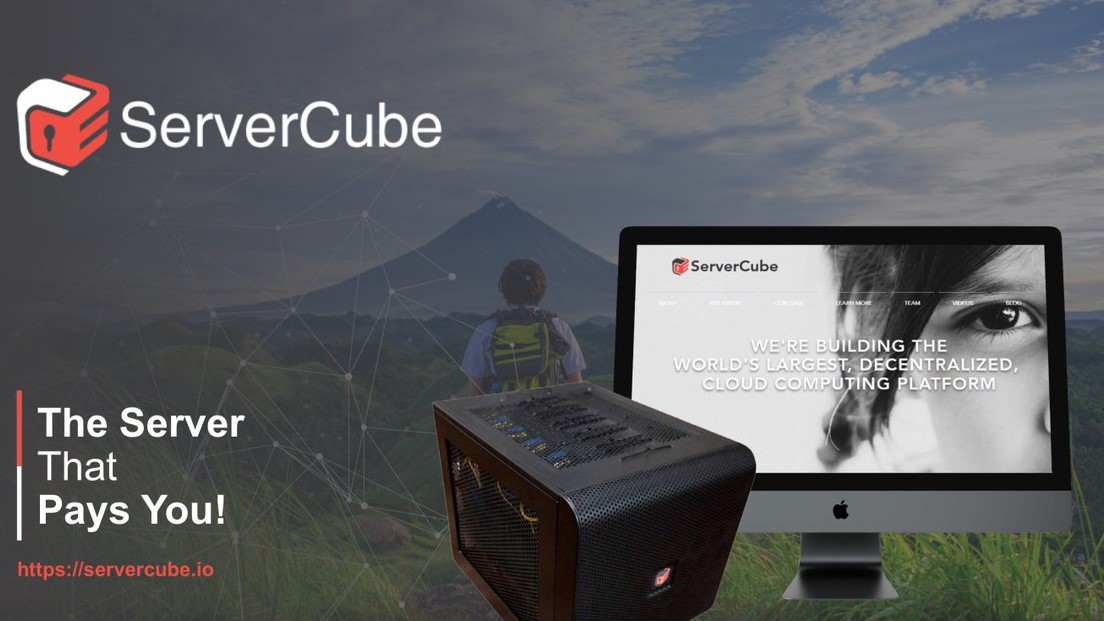How ServerCube is building the Airbnb of data centres
A server in your closet?

When you think of a data centre, you likely imagine a building filled with servers hidden from the public eye. However, what if the servers were designed in such a way that they could be placed in residential and other small, private environments instead?
We sat down with Sunil Singh, the founder of ServerCube, to better understand his vision of a powerful, 5G edge distributed computing network that truly delivers on the Blockchain paradigm.
- We've also highlighted the best small business servers
How would you describe ServerCube in 100 words to our readers?
ServerCube is building the world's largest decentralized cloud computing platform. Instead of keeping servers in a single centralized location, ServerCube's devices are distributed and provide a revenue stream for hosts that include libraries, schools, households, and small businesses around the world. Hosts provide the location and the internet connection, and ServerCube provides utilities subsidies, solar, and/or WiFi (depending on the market).
Why do you think the Servercube paradigm is superior to even more decentralised server architectures?
We have to walk a fine line - our devices need to be powerful enough to generate meaningful revenue for our hosts and the company while still being unobtrusive.
When compared to Golem, for example, it uses existing hard which is relatively older and CISC based, which is not capable of running the kind of BaaS, AI with sharding and VR applications that ServerCube can run. Morever, each of these decentralised server architectures can actually be ported and run on ServerCube, thereby enhancing what these pure software P2P technologies are capable of.
What sort of hardware will the box use?
Our current designs are based on AMD GPU AIBs and ARM AIBs supporting a variety of configurations. A key consideration for us is to keep the power draws around 1000W or less under maximum load to make them viable for residential hosts. We are AIB agnostic because the design we use in Generation 2 can support AIBs up to 1 foot in length.
You present it as the Airbnb of Datacenters. However the CAPEX for ServerCube is likely to be significant. Does your comparison still hold then?
It's not a perfect comparison, but it's pretty apt. Unlike an Airbnb guest, ServerCube will never leave hair in your shower or spill wine on your carpet. Like Airbnb, however, ServerCube is a great way to use technology to monetize extra space.
Sign up to the TechRadar Pro newsletter to get all the top news, opinion, features and guidance your business needs to succeed!
ServerCube makes it extremely easy to start hosting - especially when compared to Airbnb. Successful Airbnb hosts often make a significant investment to prepare a space for their guests. Furniture, security cameras, locks, and cleaning expenses are all examples of the kinds of investments a host might have to make. ServerCube hosts, by comparison, do not have to pay for their devices and can begin monetizing them as soon as they are installed.
As for the cost of growing ServerCube, there is no doubt that placing devices with hosts will require an up-front investment on the part of the company. Once installed, however, the devices average 95% up time and pay themselves off very quickly. This means that, by consistently reinvesting the profits from a relatively small initial pool of devices, we can exponentially increase the number of ServerCube devices in the field. Financially, it's a very sound growth plan.
You propose leaving ServerCubes in places and countries that will make them highly attractive targets to thieves. How will the cubes be protected?
Our model incentivizes hosts to take good care of ServerCube devices and keep them safe. Our relationship with our hosts is our #1 protection against loss to theft or damage. This is an area where the Airbnb comparison really rings true.
Additionally, because our business model relies on our devices being a discreet revenue source for hosts, they are very unobtrusive. They are intended to run quietly in out-of-the-way areas like basements and spare closets - places where they are unlikely to be in open view of would-be thieves.
Of course we have security features in the device including a locking frame with a physical lock and a shut off chassis intrusion switch. Our locking mechanism can also be cable tied to a stationary object such as a pipe or column. The devices are also insured against theft or damage.
How will you incentivize entities to acquire or lease the ServerCubes?
Becoming a host is sort of a no-brainer. It's free, and you'll either get utilities subsidies (in the US) or solar panels and/or WiFi (in Turkey and India) in exchange for keeping a device plugged in and connected to the internet.
As for entities looking to purchase computing power, the product offering is pretty straightforward and offered at competitive market rates.
What prevents someone like, say, Intel or Foxconn from coming up with something like this?
If I walked in to Intel and handed my IP and my business plan to the appropriate director, I doubt I would ever hear another word about it. They already have a cash cow - why would they cannibalize it to try something so radically new? It's very possible that Intel is Kodak, and swarm computing is the digital camera.
Is this similar to the NUC?
NUC is 8 generations of Intel trying to push the same single CPU multi-core CISC based technology. For high computational density requirements, we believe this model is completely inadequate. BaaS, AI/ML with sharding, and VR modeling (specifically high speed polygon rendering at resolution) require thousands of cores running the most reduced part of RISC processing as possible.
Where is your IP?
Our hardware-based IP includes the innovative case design, which allows for a powerful but unobtrusive device that uses household current, runs quietly, and produces very little heat.
Our software-based IP protects the swarm remote control of our ServerCube devices as well as the security model of our platform. Another piece of IP deals with Blockchain hash algorithm optimization. We can prove mathematically that our algorithm is 12% more efficient on the public ethereum Blockchain, for example. 12% makes a big difference when you are deploying hundreds of nodes running private Blockchains for all kinds of applications.
Where is your USP?
No one else is taking an organized approach to distributing and democratizing high performance computational capacity. Our model is the only one that rewards hosts - even hosts with no real technical background - for allowing us to put a little piece of our swarm computing network in their spare closet. It an extremely efficient model - we don't have to build or maintain massive and inefficient facilities, and we can pass that savings along to our customers.
Nobody is contesting that there's plenty of demand for computational capacity, and we intend to do well for ourselves and our investors by providing it. But we're also doing good. We're bringing solar power to the developing world while subsidizing essential institutions in the US - libraries, museums, schools, and even individual households.
We don't expect to take the data center market from Google, Microsoft and Amazon anytime soon, but we do believe that there is room for a new kind of data center. We believe that our model provides a radical alternative that can help to service this rapidly growing market, and we believe it needs to be developed.
Sunil Singh, Founder of ServerCube
Sunil has 20+ years of healthcare enterprise IT management as the CEO of DBMS Consulting, a specialized healthcare IT services and cloud solution provider to top tier pharmaceutical, medical device, biotech and government institutes globally. Sunil has an innate understanding of how global enterprises work and what is needed to achieve scale and profitability. He believes ServerCube will become the world's largest computing platform and a motivator of social uplift. He has an unmatched command on OLS suite, yet is humble and approachable.
